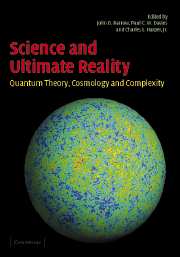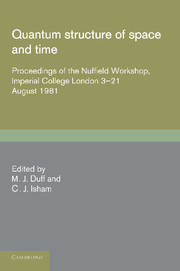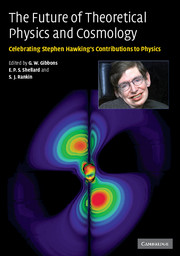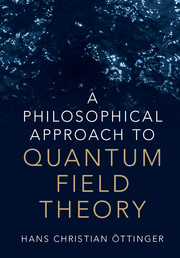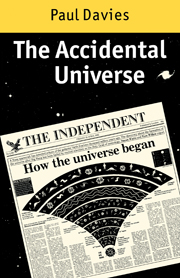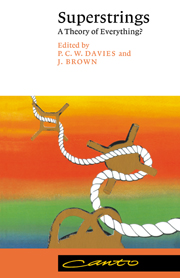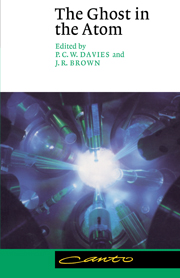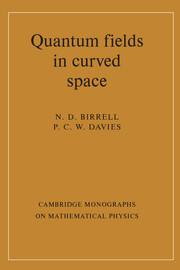Science and Ultimate Reality
Quantum Theory, Cosmology, and Complexity
- Editors:
- John D. Barrow, University of Cambridge
- Paul C. W. Davies, Macquarie University, Sydney
- Charles L. Harper, Jr, John Templeton Foundation
- Date Published: May 2012
- availability: This ISBN is for an eBook version which is distributed on our behalf by a third party.
- format: Adobe eBook Reader
- isbn: 9781139239196
Find out more about Cambridge eBooks
Adobe eBook Reader
Other available formats:
Hardback
Looking for an examination copy?
This title is not currently available for examination. However, if you are interested in the title for your course we can consider offering an examination copy. To register your interest please contact [email protected] providing details of the course you are teaching.
-
This preview of the future of physics comprises contributions from recognized authorities inspired by the pioneering work of John Wheeler. Quantum theory represents a unifying theme within the book, as it relates to the topics of the nature of physical reality, cosmic inflation, the arrow of time, models of the universe, superstrings, quantum gravity and cosmology. Attempts to formulate a final unification theory of physics are also considered, along with the existence of hidden dimensions of space, hidden cosmic matter, and the strange world of quantum technology. John Archibald Wheeler is one of the most influential scientists of the twentieth century. His extraordinary career has spanned momentous advances in physics, from the birth of the nuclear age to the conception of the quantum computer. Famous for coining the term "black hole," Professor Wheeler helped lay the foundations for the rebirth of gravitation as a mainstream branch of science, triggering the explosive growth in astrophysics and cosmology that followed. His early contributions to physics include the S matrix, the theory of nuclear rotation (with Edward Teller), the theory of nuclear fission (with Niels Bohr), action-at-a-distance electrodynamics (with Richard Feynman), positrons as backward-in-time electrons, the universal Fermi interaction (with Jayme Tiomno), muonic atoms, and the collective model of the nucleus. His inimitable style of thinking, quirky wit, and love of the bizarre have inspired generations of physicists.
Read more- Contributions from top researchers in quantum theory, cosmology and theoretical physics
- Provides a fascinating overview, exploring unanswered questions and looking at future directions for research
- Celebrates the wide variety of areas in which John A. Wheeler has been involved
Reviews & endorsements
"This preview of the future of physics comprises contributions from recognized authorities inspired by the pioneering work of John Wheeler. His inimitable style of thinking, quirky wit, and love of the bizarre have inspired generations of physicists." Astronomical Society of the Pacific
See more reviews"This is theoretical physics at its best."
Daniele Oriti, Mathematical ReviewsCustomer reviews
Not yet reviewed
Be the first to review
Review was not posted due to profanity
×Product details
- Date Published: May 2012
- format: Adobe eBook Reader
- isbn: 9781139239196
- contains: 61 b/w illus.
- availability: This ISBN is for an eBook version which is distributed on our behalf by a third party.
Table of Contents
Foreword John A. Wheeler
Editor's preface John D. Barrow, Paul Davies and Charles Harper, Jr.
Preface Freeman J. Dyson
Part I. An Overview of the Contributions of John Archibald Wheeler:
1. John Archibald Wheeler and the clash of ideas Paul C. W. Davies
Part II. An Historian's Tribute to John Archibald Wheeler and Scientific Speculation Through the Ages:
2. The heritage of Heraclitus: John Archibald Wheeler and the itch to speculate Jaroslav Pelikan
Part III. Quantum Reality - Theory:
3. Why is nature described by quantum theory? Lucien Hardy
4. Thought experiments in honor of John Wheeler Freeman J. Dyson
5. It from qubit David Deutsch
6. The wave function: it or bit? H. Dieter Zeh
7. Quantum Darwinism and envariance Wojciech H. Zurek
8. Using qubits to learn about it Juan Pablo Paz
9. Quantum gravity as an ordinary gauge theory Juan M. Maldacena
10. The Everett interpretation of quantum mechanics Bryce S. DeWitt
Part IV. Quantum Reality - Experiment:
11. Why the quantum? It from bit? A participatory universe? Three far-reaching, visionary questions from John Archibald Wheeler and how they inspired a quantum experimentalist Anton Zeilinger
12. Speakable and unspeakable, past and future Aephraim M. Steinberg
13. Conceptual tensions between quantum mechanics and general relativity: are there experimental consequences? Raymond Y. Chiao
14. Breeding non-local Schrödinger cats: a thought experiment to explore the quantum classical boundary Serge Haroche
15. Quantum erasing the nature of reality - or, perhaps, the reality of nature? Paul G. Kwiat and Berthold-Georg Englert
16. Quantum feedback and the quantum-classical transition Hideo Mabuchi
17. What quantum computers may tell us about quantum mechanics Christopher R. Monroe
Part V. Big Questions in Cosmology:
18. Cosmic inflation and the arrow of time Andreas Albrecht
19. Cosmology and immutability John D. Barrow
20. Quantum cosmology, inflation, and the anthropic principle Andrei Linde
21. Parallel universes Max Tegmark
22. Quantum theories of gravity: results and prospects Lee Smolin
23. A genuinely evolving universe Joao Magueijo
24. Planck-scale models of the universe Fotini G. Markopoulou
25. Implications of additional spatial dimensions to questions in cosmology Lisa Randall
Part VI. Emergence, Life, and Related Topics:
26. Emergence: us from it Philip D. Clayton
27. True complexity and its associated ontology George F. R. Ellis
28. The three origins: cosmos, life and mind Marcelo Gleiser
29. Autonomous agents Stuart A. Kauffman
30. To see a world in a grain of sand Shou-Cheng Zhang
Appendix A. Science and ultimate reality program committees
Appendix B. Young researchers competition in honor of John Archibald Wheeler for physics graduate students, post-doctoral fellows, and young faculty.
Sorry, this resource is locked
Please register or sign in to request access. If you are having problems accessing these resources please email [email protected]
Register Sign in» Proceed
You are now leaving the Cambridge University Press website. Your eBook purchase and download will be completed by our partner www.ebooks.com. Please see the permission section of the www.ebooks.com catalogue page for details of the print & copy limits on our eBooks.
Continue ×Are you sure you want to delete your account?
This cannot be undone.
Thank you for your feedback which will help us improve our service.
If you requested a response, we will make sure to get back to you shortly.
×
